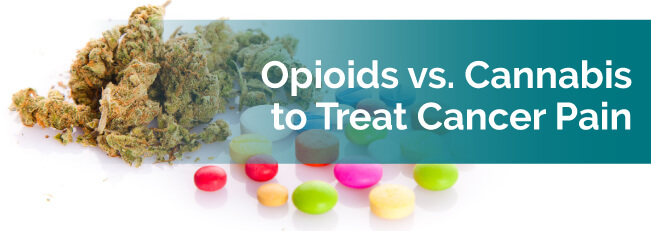
Not every cancer patient experiences pain, but if you do, it can get in the way of your day-to-day life. Besides the physical limitations, it can make it harder to cope with your symptoms and sleep.
Usually, doctors prescribe painkillers for cancer’s innate pain. However, medical marijuana is gaining popularity as an alternative source of pain relief.
Cancer patients can experience three types of pain:
Some cancers can directly cause pain. When a tumor presses on certain parts of the body, it adds painful pressure. Sometimes, cancer spreads to the bones and weakens them. But, cancer pain doesn’t always come from the disease. Certain surgeries and testing can cause pain during the procedure or after.
When cancer causes moderate to severe pain, sometimes non-opioid painkillers won’t cut it. That’s when doctors will carefully prescribe opioids to match the type of pain the patient experiences. Extended-release opioids treat longer-lasting episodes, while fast-acting opioids help with shorter-lasting pain, like breakthrough pain.
Opioids can make a huge difference for a patient when used correctly. They relieve pain more effectively than non-opioid painkillers, which can be a game-changer. However, opioids have many risk factors.
One well-known drawback of opioids is their potential for addiction. In fact, prescription painkillers often serve as a gateway drug to more dangerous opioids, like heroin. While this doesn’t mean you’ll certainly get addicted to heroin if you take an opioid, this statistic demonstrates the risk for misuse.
Additionally, you must take opioids with extreme caution to avoid overdosing. Your doctor will taper your dosage when you increase or decrease it — sudden changes can be dangerous or fatal.
Overall, opioids provide a lot of relief, but with numerous risks. Opioid patients must regularly monitor their medication regimen.
Most states that allow medical marijuana use consider chronic pain a valid condition for MMJ. Before marijuana was prohibited in the U.S., doctors often treated patients with cannabis to relieve all sorts of symptoms, including pain. So, we’ve known about the healing properties of medical marijuana for years.
Although health insurance doesn’t cover marijuana, traditional pain medicine isn’t exactly cheap, either. Americans spend billions of dollars on painkillers every year. Buying medical marijuana supports an emerging industry and saves you more money.
Marijuana also has much less severe side effects. It has much less of a potential for addiction and causes things like sleepiness and hunger that are less harmful than painkillers’ potentially fatal effects. Cannabis does not damage your liver, unlike opioids.
Medical marijuana provides more than one benefit as opposed to just pain relief. If you have depression or insomnia, certain marijuana strains can soothe those health problems in addition to your pain. This can reduce the number of medications you have to take.
A potential perk of MMJ is alleviating cancer symptoms. Preclinical studies show promise of MMJ lessening the progression of cancer and even killing cancer cells.
If you choose the right strain and it agrees with your body chemistry and lifestyle, marijuana can serve as a safer alternative to opioids.
At MarijuanaDoctors.com, we provide patients with the information they need to understand the medical marijuana industry and how cannabis can help them. We can help you find a doctor, visit a dispensary and understand your state laws.